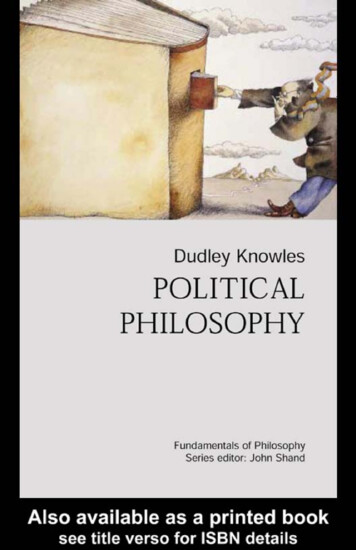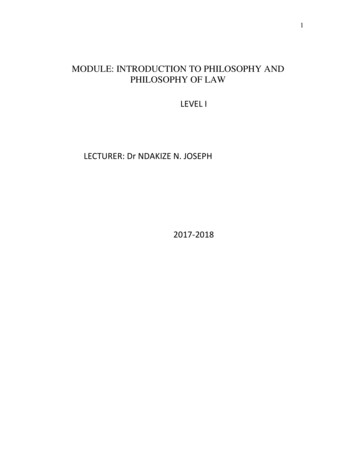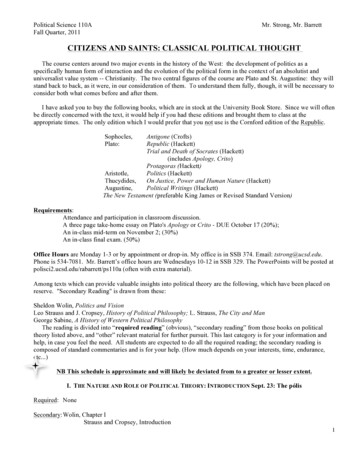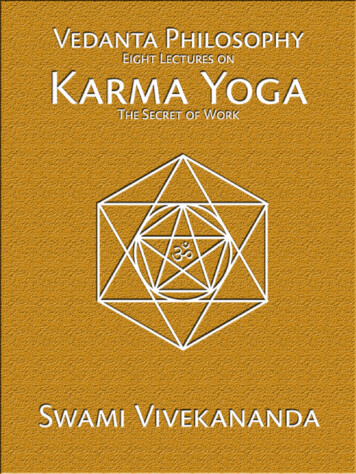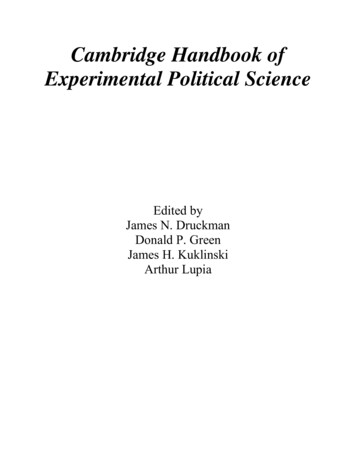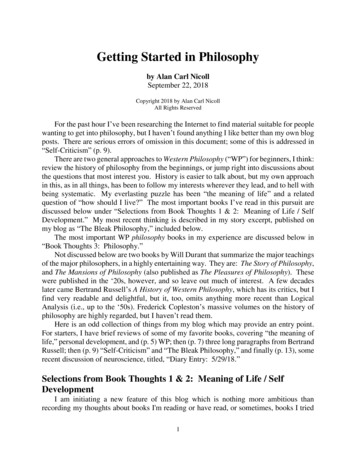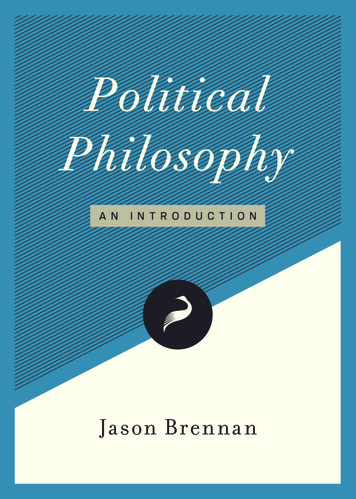
Transcription
PoliticalPhilosophy
PoliticalPhilosophyA NI N T R O D U C T I O NJason BrennanC ATO I N S T I T U T EWASHINGTON, D.C.
Copyright 2016 by the Cato Institute.All rights reserved.Library of Congress Cataloging-in-Publication DataNames: Brennan, Jason, 1979- author.Title: Political philosophy : an introduction / Jason Brennan.Description: Washington, D.C. : Cato Institute, 2016. Includes bibliographical references.Identifiers: LCCN 2016000607 (print) LCCN2016005083 (ebook) ISBN 978-1-944424-05-3 (pbk. :alk. paper) ISBN 978-1-944424-06-0 (ebook)Subjects: LCSH: Political science—Philosophy. Liberty—Philosophy.Classification: LCC JA66 .B738 2016 (print) LCC JA66(ebook) DDC 320.01—dc23Printed in the United States of America.CATO INSTITUTE1000 Massachusetts Ave., N.W.Washington, D.C. 20001www.cato.org
Libertarianism.org is the Cato Institute’s resource forexploring the theory, history, and practice of liberty.Taught by top professors and experts, Libertarianism.org Guides introduce the basic ideas and principles ofa free and flourishing society. The core of each guideis a series of short lectures given in a small seminarsetting accompanied by a book, very often from theLibertarianism.org Introduction series. Guides alsoserve as a path to further learning. If you’d like to digdeeper, each Guide’s homepage offers reading lists,essays, and links to other helpful materials.Access and watch Libertarianism.org Guidesany time and any where, and all for free, atw w w.libertarianism.org.
C O N T E N T SIntroduction . . . . . . . . . . . . . . . . . . . . . . . . . 11. Fundamental Values and Why We Disagree . . . . . . 72. The Problem of Justice and the Nature of Rights . . . . 173. The Nature and Value of Liberty . . . . . . . . . . . . 334. Property Rights . . . . . . . . . . . . . . . . . . . . . 435. Equality and Distributive Justice . . . . . . . . . . . . 576. Is Social Justice a Mistake? . . . . . . . . . . . . . . . 717. Civil Rights: Freedom of Speech and Lifestyle . . . . . 898. The Scope of Economic Liberty . . . . . . . . . . . . 1019. Government Authority and Legitimacy . . . . . . . . 11310. What Counts as “Society” ? . . . . . . . . . . . . . . 13311. Why Political Philosophy NeedsPolitical Economy . . . . . . . . . . . . . . . . . . . 141
Endnotes . . . . . . . . . . . . . . . . . . . . . . . . . 153Recommended Readings . . . . . . . . . . . . . . . . . 161About the Author . . . . . . . . . . . . . . . . . . . . . 163Libertarianism.org . . . . . . . . . . . . . . . . . . . . 165Cato Institute . . . . . . . . . . . . . . . . . . . . . . . 167
IntroductionImagine Virtuous Vani cares deeply about others and is willing to do whatever it takes tosave lives. She believes that processed sugar isa scourge killing Americans. So one day shepack s a pistol, invades the loca l 7-11, anddeclares, “This here gun says you can’t sell BigGulps anymore.”Principled Peter believes that you don’t giveenough money to charity. You’re living high whilepeople die. One day he sends you an email: “FYI:1
I ntroductionI hacked into your bank account. I transferred athird of it to poor single moms.”Decent Dani thinks you should buy Americanrather than German cars. After all, your fellow citizens provide you with roads, schools, and police. Youowe them some business. He finds you shopping at aforeign dealer, pulls out a Taser, and says, “You knowwhat? I’ll let you buy that BMW, but only if you firstpay me 3,000.”You’d probably regard Vani, Peter, and Danias criminals. How dare they treat you like that?You’d want the police to arrest them.But there’s a puzzle here. While the police wouldindeed arrest Vani, Peter, and Dani, they’re alsohappy to help other people—bureaucrats in Washington, Berlin, or Ottawa—do the same thingsVani, Peter, and Dani want to do. So this set ofexamples suggests a few questions: What, if any2
POLITICAL PHILOSOPHYthing, explains why it’s wrong for Peter to take athird of your income but not wrong for the government tax office to do so? What, if anything, justifiesthe Food and Drug Administration in determiningwhat you can and can’t eat but forbids Vani fromdoing so? In general, governments claim the rightto do things ordinary people may not do. What, ifanything, justifies that?This is one of the central questions in politicalphilosophy. There are many others: What kindof government, if any, ought we have, and whatshould it be permitted and forbidden to do? Do wehave any moral obligation to obey our government’slaws and commands? What rights do people have,and why? Should people be allowed to own privateproperty? If they don’t have enough property to livewell, should the government provide it through taxfunded welfare programs? Should people be free to3
I ntroductionchoose what to eat, how to live, what to worship,what to say, or on what terms they will work? Is itimportant that everyone have equal opportunity tosucceed? Should we make sure everyone ends upequally successful? Should people be allowed toemigrate freely? When, if ever, is war justifiable?What’s more important: liberty or equality? Andwhat exactly is liberty, anyway? Political philosophy is the branch of philosophy that attempts toanswer these questions in a rigorous way.In the abstract, political philosophy is the normative analysis of social institutions. Institutions are“the rules of the game in a society or, more formally,are the humanly devised constraints that shapehuman interaction.” 1 For example, if you think aboutit, democracy and monarchy are really a set of rulesabout who gets to make the rules. The institution ofmarriage is a set of rules about how to allocate and4
POLITICAL PHILOSOPHYcontrol property, children, and sex. The institutionof private property is a set of rules about who gets touse, modify, trade, and destroy various goods.Political philosophy tries to determine the properstandards by which we can judge institutions asgood or bad, just or unjust. Of course, to pass judgment on institutions, we usually need to know howthey actually work and what the alternatives are.For that, we need the social sciences—economics,political science, sociology, and anthropology. Still,the social sciences alone aren’t enough to determinewhich institutions are best. The social sciences cantell us what the trade-offs are—for instance, thatstrict economic equality might come at the expenseof economic growth—but they don’t tell us whichalternative to take. Is it better to be equal but worseoff, or is it better to be unequal but better off? Toanswer that question, we have to think critically5
I ntroductionabout justice. We’ll have to know how to weighequality against freedom or prosperity.This is a primer on political philosophy. My goalhere is to give you a working knowledge of many ofthe major issues, ideas, and arguments in political philosophy. I won’t be neutral regarding all the theoriesand arguments we consider, but I’m also not going totry to convince you of any particular ideology.6
1FundamentalValues and WhyWe DisagreeConsider how we evaluate hammers. We thinkhammers serve a purpose: to pound in nails. Wejudge hammers good or bad by how well theyserve that purpose.In contrast, consider how we tend to evaluatepaintings. Here, we think paintings are good or7
F unda m enta l Va l ues and W h y W e D isag reebad because of what the paintings symbolize, orhow beautiful they are, or who made them.Now consider how we tend to evaluate people.People can be more or less useful or beautiful, andwe do tend to care about who “made” them. (Afterall, most people value their own children morethan they do others’.) But we also tend to regardpeople as ends in themselves—valuable for theirown sake.Now ask yourself, which of these models is the bestway to think about the value of institutions? Somepeople might believe institutions are valuable becauseof how functional they are, because of what goals theyhelp us achieve. (If so, which goals are we supposedto achieve?) Others might hold that institutions are(at least partly) valuable because of what they symbolize or who made them. (Consider: many peoplebelieve that laws, regardless of their content, become8
POLITICAL PHILOSOPHYjust, fair, or legitimate simply if they are passed by ademocratic legislature.) Others hold that some institutions are ends in themselves. (Consider: many people believe that democracy is inherently just and thatit itself is the ultimate value, even if other politicalsystems perform better.)People do not merely debate which institutions arejust or good: they also debate standards by which weshould evaluate institutions. People disagree aboutwhat justice requires.When we see persistent disagreement about justice, we feel tempted to throw up our hands andconclude that there’s no truth of the matter, thatopinions about justice are purely subjective. Butthat’s a mistaken inference. The mere fact that people disagree tells us little about whether there’s anunderlying truth. Disagreement is ubiquitous. Peopledisagree about all sorts of things—whether evolu9
F unda m enta l Va l ues and W h y W e D isag reetion happened, whether vaccines work and whetherthey cause autism, or whether the Earth is older than6,000 years—about which we have overwhelmingevidence for one side. Political psychologists—people who study how minds process political information—routinely find that most of us think aboutpolitics in biased—that is, irrational—ways. 2 It’snot surprising they disagree about what the evidence implies.We don’t simply disagree with each other. Most ofus also disagree with ourselves.Most people endorse a wide range of moral judgments. Some judgments are general and abstract(e.g., “All things equal, increased happiness isgood”), some are particular (e.g., “What you didwas wrong! ”), and others are in between (e.g.,“Slavery is wrong”). We arrive at these beliefs for ahost of reasons. Some we are more or less born pre10
POLITICAL PHILOSOPHYdisposed to accept, others we learn at our mother’sknee, others we absorb from our peers, and some areconclusions from conscious deliberation.We have thousands of moral beliefs of varyingdegrees of generality or particularity. We cannothold all our moral beliefs in conscious thought allat the same time—we might instead be able to consciously think about only five or six ideas at once.We thus cannot check all at once to ensure that ourbeliefs are consistent—that is, that these beliefsdon’t contradict each other. For that reason, mostof us endorse a range of moral judgments that conflict with each other and cannot all be true at thesame time. Part of what political philosophy doesis bring these conflicting beliefs to light and thenattempt to resolve the contradiction. Usually, thatmeans giving up some beliefs—the ones we’re lessconfident in—for the sake of others.11
F unda m enta l Va l ues and W h y W e D isag reeFor instance, the typical American believes slavery is wrong because people have an inalienableright to be free. The typical American also believesthat people should be allowed to do what theywant, provided they don’t hurt others. Now consider this: Is voluntary slavery permissible? TypicalAmericans have a set of moral beliefs that seem tocommit them to answer both yes and no. Or typical Americans believe that people have the right tochoose to associate with whomever they want. Butthey also believe that business owners have no rightto refuse service to black or gay people.Sometimes, when we disagree about politicalmatters, it’s because we have different values, butsometimes it’s because we disagree about the facts.So, for instance, the left-liberal philosopher JosephHeath and I disagree about the extent to which government should regulate the market. Our disagree12
POLITICAL PHILOSOPHYment doesn’t result from disputes over fundamentalvalues. Instead, Heath and I have different viewsabout how well markets and governments work orhow often markets and governments make mistakes.We have more or less the same standards—we agreeabout what it means to “work” and to “mess up”—but we disagree empirically about how well marketsand governments meet those standards.For all these reasons, there is no straightforwardone-to-one logical correspondence between any setof background moral, religious, and social-scientificviews and any particular political philosophy. 3 Aleft-liberal can be religious or atheistic. A socialistcould endorse any of the major moral theories,have no coherent moral theory, or even be a resolute moral skeptic. A libertarian could endorseAustrian economics or accept more mainstreamneoclassical economics.13
F unda m enta l Va l ues and W h y W e D isag reeThat said, different political philosophies do tendto emphasize one set of principles over others: 4 Classical liberal and libertarian political philosophies emphasize individual freedom and autonomy.They hold that to respect people as ends in themselves, all people must be imbued with a wide sphereof personal autonomy in which they are free todecide for themselves. Most also believe that imbuing each person with this wide sphere systematicallyproduces greater prosperity, cultural progress, tolerance, and virtue. Communitarian and conservative political philosophies tend to emphasize order and community. Forconservatives, civilization is a hard-won victory. Theyworry that the social order upon which we depend isunstable. Maintaining that order requires that people have a sense of the sacred and that they subscribeto common ideals, moral views, or cultural myths.14
POLITICAL PHILOSOPHYCommunitarians additionally hold that the collectiveor the group is in some way of deeper fundamentalimportance than the individual. Left-liberal and socialist philosophies tend toemphasize material equality and equality of socialstatus. They regard equality as inherently fair andbelieve departures from material equality must bejustified. Socialists tend to believe that few suchdepartures can be justified and that private propertyis a threat to equality. Left-liberals are more sanguineabout markets and private property. They tend tohold that inequality is justified so long as it benefitseveryone, especially the least advantaged members ofsociety. They advocate having market-based economies but believe that government should rein in theexcesses of the market and ensure that each persongets a fair shot at a decent life.15
2The Problemof Ju stice and theNature of RightsTwentieth-century left-liberal political philosopher John Rawls characterized a society as a“cooperative venture for mutual gain.” 5 In all butthe worst of societies, we’re each far better off living together than apart. For that reason, we eachhave a stake in society and in the basic institutions17
T h e P ro b l e m of J ustice and t h e N ature of R i g h tsthat hold it together and that structure the termsof cooperation.But while we each have a stake in the rules, therules can also be a source of conflict. Different institutions—different rules of the game—tend to “distribute” the benefits and burdens of living togetherdifferently. Rawls doesn’t mean to overstate this.The rules of the game don’t straightforwardly translate into particular life outcomes for any of us. Afterall, how our lives go depends in part on individualchoice. Still, the rules make a difference. So, forexample, a society with the institutions of medieval Europe or Japan will tend to best reward thoseborn into the right families and secondarily rewardthose with a talent for fighting. The United States’scurrent institutions tend to most reward those withhigh IQs or those good at cultivating political networks. The present world order—a world divided18
POLITICAL PHILOSOPHYinto nation-states that forbid most internationalemigration—tends to favor skilled professionals overunskilled workers. 6Most of us prefer having more stuff rather thanless. We prefer having higher rather than lower status. So, Rawls said, self-interested people are likelyto disagree on just which institutions and rules arebest. They each tend to favor whatever rules benefitthem. Principles of justice, Rawls said, are supposedto resolve this disagreement in a fair or reasonableway. Principles of justice are meant to determine themorally reasonable way to assign rights and dutiesand to determine the proper distribution of benefitsand burdens of social cooperation.Consider one simple theory of justice: utilitarianism. In its crudest form, utilitarianism holds weshould just do whatever maximizes net aggregatehappiness. Pretty much everyone agrees that happi19
T h e P ro b l e m of J ustice and t h e N ature of R i g h tsness is intrinsically good and that pain is intrinsically bad. It seems plausible that we should try tomaximize the total happiness of society and minimize the total pain. Utilitarianism leaves us with asimple imperative: pick the action that produces themaximal expected net utility. Many economists thusfind utilitarianism attractive. It reduces questions ofjustice to the search for what economists call KaldorHicks efficiency. 7 Many times, when economists orothers say they are “pragmatists” who eschew whatthey regard as hifalutin’ theories of justice, what theymean is that they’re utilitarians of some sort.This crude sort of utilitarianism appears plausibleat first glance. But it has serious defects. It seemsunproblematic for me to make trade-offs with myown welfare. Suppose I cause myself some sufferingnow to get greater overall happiness later. I couldsuffer through accounting class to land a better job20
POLITICAL PHILOSOPHYor accept painful shots to prevent disease. But suppose instead that we make you suffer so I can enjoygreater happiness. Imagine we hurt you to help me.On its face, that doesn’t seem right.Yet crude utilitarianism happily condones hurtingyou to help me, provided I benefit more than you suffer. That’s the essential problem with utilitarianism.It imagines us each to be receptacles for pleasure andpain. So long as we maximize net aggregate happiness, it doesn’t really matter whether some peoplesuffer greatly so that others may be happy.Fiction writer Ursula K. Le Guin’s short story “TheOnes Who Walk Away from Omelas” illustrates thisproblem. The story describes an idyllic, almost utopian society. There is no war or disease. Everyoneis healthy, beautiful, and happy. However, we soonlearn that Omelas has a secret. A single child is keptimprisoned in a closet, filthy, starved, tortured, and21
T h e P ro b l e m of J ustice and t h e N ature of R i g h tsafraid. It turns out that, through some sort of magic,torturing the child is what makes the city so splendid. At some point in their education, all citizens ofOmelas are brought to see the child. Le Guin endsher story by describing how each night, a few citizenswalk away from Omelas.Omelas appears to be a counterexample to utilitarianism. If utilitarianism were true, then Omelaswould be a just city. However, Omelas is unjust.Therefore, utilitarianism can’t be true.In Anarchy, State, and Utopia, the 20th-centurylibertarian philosopher Robert Nozick introduced asimilar thought experiment. He asked us to imagine a “utility monster,” a person who enjoys watchingothers suffer more than those others hate suffering. 8So suppose I am a sadistic utility monster with analmost-infinite capacity for pleasure. Whenever Iwatch someone being tortured, if that person feels,22
POLITICAL PHILOSOPHYsay, X units of pain, I experience X 2 units of pleasure. Utilitarianism implies that if a utility monsterexisted, we “should all be sacrificed in the creature’smaw, in order to increase total utility.” 9 Utilitarianism implies we are morally obligated to feed ourselvesto the utility monster. That seems absurd.Some people might complain that these thoughtexperiments are unrealistic and therefore tell us littleabout what’s right and wrong. It’s not clear what forcesuch objections have. In fact, we have little troublemaking moral evaluations of unrealistic circumstances. The Force in Star Wars isn’t real, but evenmy young children can judge it’s immoral to use theDark Side of the Force. Godzilla isn’t real, but if youproduced a moral theory that implied “you shouldfeed your kids to Godzilla for fun,” the theory wouldbe, for that very reason, absurd. The purpose of thesethought experiments is to isolate the various morally23
T h e P ro b l e m of J ustice and t h e N ature of R i g h tsrelevant factors, and they are designed to be extremein order to make the problems clear and vivid.If you find that unsatisfying, note that we have lessextreme versions of such problems in the real world.Governments frequently make decisions by whichthey might exploit or harm the few to help the many.Consider, for instance, the United States decidingto bomb a city block to kill a terrorist, knowing itmight kill 50 innocent civilians for every terrorist.Or suppose the French government ponders imposing a wealth tax, harming the few to help the many.Nozick and Rawls both concluded that utilitarianism fails to respect the “separateness of persons.”The idea here is that all people are ends in themselveswith separate lives to lead. They are not tools to beexploited for maximizing aggregate utility. We cannot force people to suffer for the sake of others. Thus,they both argue, to respect the separateness of per24
POLITICAL PHILOSOPHYsons, we might see them each as having an extensiveset of rights. The child in Omelas has a right not to betortured even if that would maximize utility. Rightsare trump cards that forbid people from using us tofurther their goals.Early 20th-century legal theorist Wesley Hohfeldargued that one person having a right entails corresponding duties on the part of others. For instance,if I say, “I have a right to life,” this means, “Otherpeople have an enforceable duty, owed to me, not tokill me.” When I say, “I have a right to free speech,”what I mean is, “Other people have a duty, owed tome, not to interfere with my speaking or punish mefor it.” When I say, “My sons have a right to parentalcare,” what I mean is, “My wife and I have a duty,owed to them, to feed and care for them.” In short,to say a person has rights is to say other people haveenforceable duties toward that person. 1025
T h e P ro b l e m of J ustice and t h e N ature of R i g h tsNote that to say you have a right to do something does not entail that it’s right for you to do it.It means others shouldn’t stop you from doing it.For instance, I have a right to advocate Nazism.I shouldn’t—it’s an evil view—but I should beallowed to do so.In Anarchy, State, and Utopia, Nozick argued thata theory of justice could give rights a central placebut still fail to think about rights the right way.Imagine a “utilitarianism of rights.” This theorywould hold that we ought do whatever minimizesrights violations. This utilitarianism of rights wouldstill fail to take rights seriously. This theory wouldstill sanction frequent serious rights violations, provided doing so leads to fewer net rights violations.Many of the familiar counterexamples to utilitarianism remain. For instance, Omelas violates thechild’s rights, but in doing so minimizes net rights26
POLITICAL PHILOSOPHYviolations. After all, it has no crime other than thetorture, and so it has fewer rights violations thanDenmark or Sweden. Or to take a real case, theU.S. government spies on us, but it claims to do soto stop others from violating our rights even more.So, Nozick might say, the U.S. government caresabout rights but not in the right way.Nozick argued instead that rights are side constraints. They tell us what we can’t do. Sure, all thingsequal, we should choose institutions and actions thattend to minimize rights violations, but we should doso without first violating others’ rights. The nonviolation of rights trumps the protection of rights. Togive an example, suppose (I think contrary to fact)that allowing the Federal Bureau of Investigation(FBI) to engage in warrantless wiretapping tends tominimize total rights violations. A side-constraintview of rights would hold that this is wrong: the FBI27
T h e P ro b l e m of J ustice and t h e N ature of R i g h tscannot violate rights in order to minimize the violations of these rights.To hold that people have rights or to conclude thatutilitarianism is false is not to say that consequencesdon’t matter. On the contrary, as we’ll see below, oneof the most common arguments on behalf of rights isthat respecting rights as side constraints itself tendsto produce good consequences. Though it mightsound paradoxical, the argument is that forbiddingindividuals (and government) from violating rights,and setting constraints on their pursuit of utility,itself tends to maximize utility. That is, forbiddingpeople from trying to do whatever it takes to maximize their own prosperity can itself help to maximize everyone’s prosperity.So far, we’ve just been analyzing how rights workand why they’re important. But this leaves openmany questions:28
POLITICAL PHILOSOPHY1. Which rights do we have?2. How strong are these rights? Are they absolute or merely pro tanto?3. Can we alienate or forfeit some of these rights?To say a right is absolute is to say it’s always wrongto violate it and no other consideration can outweigh it. To say a right is pro tanto is to say there isa strong moral presumption against violating thatright but that sometimes, in special circumstances,other moral considerations can outweigh the dutyto respect that right. Many philosophers, includingNozick and Rawls, think rights are probably notabsolute. We cannot violate people’s rights for justany reason or just to gain significant amounts of utility. So, for instance, if outlawing Mormonism in theUnited States somehow led to a 20 percent boostin gross domestic product over the next 10 years,29
T h e P ro b l e m of J ustice and t h e N ature of R i g h tsthat would not be a sufficient reason to violate rights.However, perhaps the duty to respect rights can beoutweighed by a concern to “avoid disaster.” So suppose the only way to stop the spread of a horrificdisease is to quarantine everyone who is currently ina hospital where the disease was detected. Perhapsthis would be justified.To say a right is alienable is to say it can be transferred to others—that is, that one person can losethe right and another person can acquire it. Somerights—such as rights to a guitar—are alienable.You can sell or give away a guitar. Other rightsmight not be. Suppose I, Jason Brennan, wish tosell myself into slavery, provided the slaver paysmy family 100 million. Most people think I don’thave the right to sell my rights.To say a right is forfeitable is to say that if people act in certain ways they can lose that right. For30
POLITICAL PHILOSOPHYinstance, if I leave my bicycle in the woods for 20years, never touching it, I might lose my ownershiprights over it. It reverts back to the commons. Anyone who finds it can claim it. Or suppose I walkinto a public park and start shooting at some kids.In that case, people would be free to kill me to stopme from shooting, and so I would at least temporarily forfeit my right to life.It’s a platitude that one person’s rights end whereanother person’s begin. My right to free speechdoesn’t mean I have a right to show up in your houseat two o’clock in the morning to recite Slayer lyrics.Your right to own a baseball bat doesn’t imply a rightto smash up your neighbor’s Corvette.Thus, the thing a theory of rights must do isclear up what the boundaries of our rights are. Forinstance, it’s obvious that my exerting a weak gravitational pull on your house as I walk by doesn’t31
T h e P ro b l e m of J ustice and t h e N ature of R i g h tscount as trespassing, but throwing a party therewithout your permission does. But there are someharder cases. For example, how about letting yourdog defecate on my lawn so long as you immediately pick it up?32
3The Nature andValue of LibertyThe United States touts itself as the “land of thefree.” Before we can assess whether it deserves thatlabel or whether that’s a label worth having, we needto know what freedom is.The early 20th-century political philosopher Isaiah Berlin, in his famous essay “Two Concepts ofLiberty,” claimed that historians have documentedover a hundred different ways natural English speak33
T h e N ature and Va l ue of Li b ert yers tend to use the terms “liberty” and “freedom.” 11In natural language, the terms do not have onemeaning. That said, Berlin identified two principalways philosophers and others have tended to use theterms, which he dubs negative and positive liberty.Negative liberty connotes the absence of something:impediments, constraints, interference, or domination from others. So for instance, the American Constitution is supposed to protect freedom of speech byprohibiting Congress from passing laws interferingwith one’s exercise of speech. Or when we talk about“free trade,” we mean an economic system in whichno one stops you from trading with foreigners. Inboth cases, freedom connotes the absence of interference from others.Positive liberty connotes the presence of something, usually some power, ability, or capacity. Berlin meant “positive liberty” to refer to the capacity34
POLITICAL PHILOSOPHYof self-mastery—that is, the ability to choose one’sgoals and actions in a rational, autonomous way. 12However, in contemporary philosophical writing,it’s more common for “positive liberty” to refer to thecapacity to achieve one’s ends or goals. So, for example,when we sa
INTRODUCTION about justice. We’ll have to know how to weigh equality against freedom or prosperity. This is a primer on political philosophy. My goal here is to give you a working knowledge of many of the major issues, ideas, and arguments in political phi
